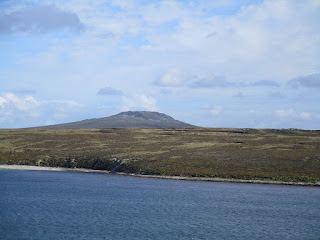Children the same ages in the Falkland Islands looked out on Argentine tanks rolling down the streets, with the fear that the next bomb would hit their house, with the uncertainty of whether they would be able to stay in school or if their whole family would be moved at gun-point to a distant farm along with dozens of strangers.
 The Falklands is part of the British Commonwealth, just as Hawaii was a part of the United States before it became a state. The people speak English, use currency called the pound and drive on the left side of the road. Less than 10% speak Spanish. A few hundred years ago the French, Spanish and Portuguese fought over the land because it was a stopping point on the way around the tip of South America. Since the Panama Canal made that hazardous trip unnecessary for shipping, its importance has diminished. So, why fight over that little bit of land where only about 3500 people live?
The Falklands is part of the British Commonwealth, just as Hawaii was a part of the United States before it became a state. The people speak English, use currency called the pound and drive on the left side of the road. Less than 10% speak Spanish. A few hundred years ago the French, Spanish and Portuguese fought over the land because it was a stopping point on the way around the tip of South America. Since the Panama Canal made that hazardous trip unnecessary for shipping, its importance has diminished. So, why fight over that little bit of land where only about 3500 people live?We fought when Japan invaded Hawaii, and there were a lot of people there who came from Japan. Many different languages were spoken. However, it was part of our country, and that is why the British fought. A recent referendum asked the local residents if they wanted to stay part of the British empire. The turnout was almost 98% of the voters, and they voted, over 99%, to remain with Britain.
Recent discoveries of oil have increased the importance of The Falkland Islands. If the Panama Canal were to be closed, the Falklands would once again be vital to shipping. They are also an important launching point for Antarctic exploration.
Today we visited the "human" side of the island; tomorrow we will see the penguins. After a 25 minute tender ride, we had a 2 hour tour. Outside the city there was not too much to see. There are several wrecks in the surrounding waters, many of which were damaged rounding Cape Horn. One of the ships was carrying guano when it sprang a leak. By the time it reached Port Stanley, it was reeking and the whole crew deserted. Another was carrying jars of acid which broke in the rough seas. They barely made it to port, bailing madly, before most of the bottom was eaten away.

 There are no trees in the Falkland Islands except those planted, wrapped and nurtured. The wind is so strong that it either blows them over or dries them out. Most of the vegetation is low lying, with thick leaves unless it can grow among other plants which protect it. One such plant is "Fiddle Dee." Its red berries are bitter, but if you add enough sugar, it makes a fine jam. Another was used as a preventative for scurvy. Even if the sailors did not know what caused scurvy, they found that chewing this helped prevent it, so they took it along. It is high in Vitamin C, and can be dried and used to make a lemony tea.
There are no trees in the Falkland Islands except those planted, wrapped and nurtured. The wind is so strong that it either blows them over or dries them out. Most of the vegetation is low lying, with thick leaves unless it can grow among other plants which protect it. One such plant is "Fiddle Dee." Its red berries are bitter, but if you add enough sugar, it makes a fine jam. Another was used as a preventative for scurvy. Even if the sailors did not know what caused scurvy, they found that chewing this helped prevent it, so they took it along. It is high in Vitamin C, and can be dried and used to make a lemony tea.Some of the homes are still heated by peat fires, so we stopped to see how peat "bricks" were harvested. Many homesick sailors added to the totem pole with a sigh for the distance to home. One local resident collects whale bones and displays them in his yard for all to see.
 |
| The totem pole |
 |
| Peat "mining" |
 |
| Whale bones, anyone? |

This resident made his choice clear: he wanted to stay with the British and live peacefully!
There are many monuments to past wars.
 |
| Monument to those killed in the Argentine invasion. |
 |
| World War I monument |
 The local museum chronicles life in the small town, with articles about local characters and a figurehead from a sunken ship found washed up on a beach many years after the ship sank. Penguins and whales are favorite themes both in the town and with local tourists.
The local museum chronicles life in the small town, with articles about local characters and a figurehead from a sunken ship found washed up on a beach many years after the ship sank. Penguins and whales are favorite themes both in the town and with local tourists. |
| A "friend" to take back on the ship |
 |
| The weekly newspaper |
 Even the church has whale bones.
Even the church has whale bones.


Yeah, Penguins!!
ReplyDelete